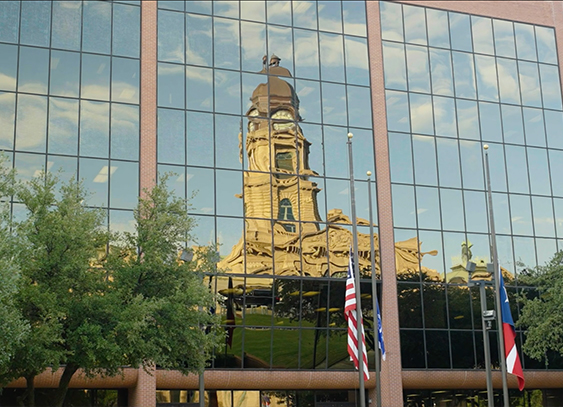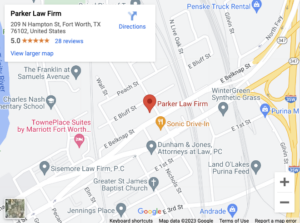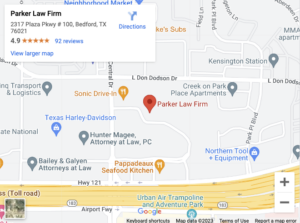Right-of-Way Laws in Fort Worth, TX

Traffic laws provide rules to guide cars sharing the road as to when it is their turn to drive. These laws are called right-of-way laws. Understanding and respecting right-of-way laws is fundamental to safe driving; these rules help prevent accidents and ensure a smooth flow of traffic. This blog will focus on the right-of-way laws in Texas.
What Is Right of Way?
“Right-of-way” refers to the privilege of a driver or pedestrian to proceed first in a traffic situation. Section 541.401(8) of the Texas Transportation Code defines “right-of-way” as the “right of one vehicle or pedestrian to proceed in a lawful manner in preference to another vehicle or pedestrian that is approaching from a direction, at a speed, and within a proximity that could cause a collision unless one grants precedence to the other.” In brief, this means that cars take turns — and cede turns to other cars — to prevent collisions.
This privilege is usually governed by rules and regulations to ensure safety and prevent conflicts on the road. Drivers must be attentive at intersections in order to know whose turn it is. Understanding right-of-way laws can help drivers make informed and safe decisions on the road.
Types of Right of Way
In Texas, there are several common right-of-way situations that drivers encounter regularly.
- At Intersections: When two vehicles arrive at an intersection simultaneously, the vehicle on the right has the right of way. However, when turning left, the vehicle turning must yield to oncoming traffic.
- Uncontrolled Intersections: At intersections without traffic signs or signals, the vehicle that arrives first or the vehicle to the right has the right of way.
- Pedestrian Crossings: At crosswalks and pedestrian crossings, pedestrians always have the right of way. Drivers must yield to pedestrians who are in or approaching the crosswalk.
- Four-Way Stops: At four-way stops, the vehicle that arrives (comes to a complete stop at the stop line) first or the vehicle to the right goes first. If in doubt, yield to the vehicle on your right.
- Emergency Vehicles: When emergency vehicles with sirens and lights on approach, all other vehicles must yield the right of way and pull over to let them pass safely.
These are just some of the situations that give rise to common right-of-way violations. This is not an exhaustive list; keep your eyes peeled for unusual or unclear traffic conditions in your area.
Right-of-Way Violations
Understanding Texas right-of-way laws, found in section 545.151 of the Texas Transportation Code, is essential for preventing accidents and ensuring safety on the road. Failing to yield the right of way can result in accidents, injuries, and legal consequences. Penalties for right-of-way violations in Texas can include fines, license points, and even criminal charges. A driver responsible for a right-of-way collision that leads to bodily injury can be fined $2000 – or $4000 if the others suffered serious bodily injury.
Furthermore, the driver responsible for the others’ injuries can be sued for negligence. Plaintiffs can bring negligence claims when someone else on the road has breached their duty to drive safely. If the driver has violated a law, this may be considered negligence per se: failing to follow the law was a breach of the driver’s duty to drive safely.
If you were partially responsible for the accident but were injured, you may still be able to recover damages. Under contributory fault laws in Texas, accident victims can still recover compensation even if they are partially (but no more than 50%) at fault.
Tips for Staying Safe on the Road in Texas
Drivers can ensure that they drive safely and follow all traffic laws to avoid car accidents. Here are a few tips for road safety and compliance with right-of-way laws.
- Stay informed. It’s essential to familiarize yourself with right-of-way laws and understand the common scenarios where right-of-way rules apply.
- Be patient. Always be patient and courteous when yielding the right of way. It is better to wait a few extra seconds than to risk an accident.
- Be vigilant and yield. Always yield to pedestrians at crosswalks and intersections, ensuring their safety.
- Know the laws. Follow the rules at four-way stops to avoid confusion and potential accidents.
As a responsible driver, understanding and respecting right-of-way laws is not only a legal requirement but also a crucial aspect of road safety. At Parker Law Firm Injury Lawyers, your safety and legal well-being are our top priorities.
Our attorneys in Fort Worth, TX, are dedicated to helping you navigate the legal landscape and bring your personal injury claim. Learn more by contacting us for a free consultation.
Contact the Fort Worth Personal Injury Lawyers at Parker Law Firm Injury Lawyers for Help Today
For more information, please contact an experienced personal injury lawyer at Parker Law Firm Injury Lawyers to schedule a free initial consultation today. We have convenient locations in Bedford and Fort Worth, Texas.
Parker Law Firm Injury Lawyers – Bedford
2317 Plaza Pkwy #100,
Bedford, TX 76021
(817) 503-9200
Parker Law Firm Injury Lawyers – Fort Worth
209 N Hampton St,
Fort Worth, TX 76102
(817) 839-3143


